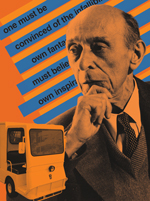University of Southern California
Los Angeles, CA
USA

The revolutionary music of twelve-tone composer Arnold Schoenberg will course through USC during a five-day, campus-wide sound installation, a lecture and a concert featuring some of Schoenberg’s greatest works, played by pianist Aron Kallay and USC Thornton students.
Schoenberg’s twelve-tone technique represented a completely new musical system, and it radically altered the course of modern composition. A lecture by Paul Chaikin will illuminate how Schoenberg’s notion of “the emancipation of dissonance” asks us to deeply consider—and reconsider—how we listen not only to music, but also to everything that surrounds us.
An evening concert will feature Drei Klavierstücke, a piano opus that is a landmark of music history, performed by pianist Aron Kallay, and Verklärte Nacht, Schoenberg’s earliest important work, performed by the Thornton students led by Karen Dreyfus.
“One must believe in one’s own inspiration,” Schoenberg said. Join us to be inspired by one of twentieth-century music’s most influential figures.
About the Artists:
Paul Chaikin joined the musicology faculty at the USC Thornton School of Music in 2011. His research interests include German opera, aesthetic theory and the history of perception. At USC, he has taught courses on opera, classical music, popular music and jazz. He earned his PhD at Brown University in 2010.
Karen Dreyfus has performed extensively in the United States, Canada, Europe, Asia and South America. She has collaborated with Marlboro, Philomusica, Theatre Chamber Players of the Kennedy Center, the New York Philharmonic, the Orpheus Chamber Orchestra, Rudolf Serkin, Alexander Schneider, Leon Fisher, Chick Corea and her husband, Glenn Dicterow. Dreyfus has performed in recital with Yehudi Menuhin at Carnegie Hall, and has been awarded in competitions such as the Naumburg Viola Competition, the Lionel Tertis Competition, the Washington International Competition, the Hudson Valley Competition and the National Endowment for the Arts Solo Recitalists. She is a founding member of the Amerigo Trio, Lyric Piano Quartet and the Antonin Quartet. Recently Dreyfus, along with the Lyric Piano Quartet, released a recording of piano quartet works of Strauss and Turina for Black Box Records. Dreyfus joined the faculty of the USC Thornton School of Music in 2013.
Pianist/composer Dr. Aron Kallay has been praised as possessing “that special blend of intellect, emotion and overt physicality that makes even the thorniest scores simply leap from the page into the listeners’ laps.” He is an award-winning, TED talk–giving, Grammy-nominated pianist who has performed around the world. A champion of contemporary composers, microtonal music and music that combines electronics with acoustic instruments, Kallay has expanded the repertoire by commissioning new works that challenge the idea of what it means to be a pianist in the 21st century. Kallay is a co-director and co-founder of People Inside Electronics (PiE), a concert series that features new and classic electro-acoustic music; the managing director of MicroFest; and the founding director of Tuesdays@Monk Space. He is on the faculty of USC, Chapman University and Pomona College, where he teaches piano, music theory, electro-acoustic media and music technology.
Organized by David Schafer (Critical Studies).
